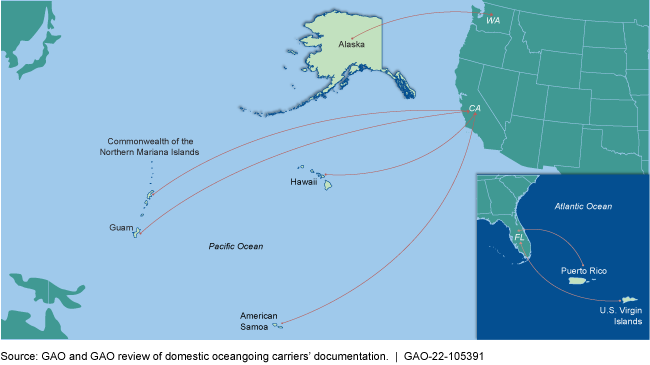Domestic Oceangoing Shipping: Information on the Surface Transportation Board's Regulatory Processes
Fast Facts
Almost 6 million people living in Hawaii, Alaska, Puerto Rico, and other noncontiguous U.S. lands depend on ships to deliver goods from the mainland. U.S. policy encourages reasonable shipping rates, and the Surface Transportation Board can determine reasonableness.
The Board can start a review of shipping rates itself or in response to complaints. It has 3 methods for determining whether a rate is reasonable. Those who file complaints can specify which method they'd like the Board to use.
The Board last received a formal complaint in 1999 and hasn't self-initiated a rate review.
Noncontiguous States and Territories Where Domestic Oceangoing Carriers Transport Cargo

Highlights
What GAO Found
Almost 6-million people living in Hawaii, Alaska, Puerto Rico and other noncontiguous U.S. territories and possessions depend on maritime transportation of vital goods from the mainland (contiguous) U.S. (see figure). These shipments include items such as food products and other goods.
Map of Noncontiguous States and Territories Where Domestic Oceangoing Carriers Transport Cargo

For domestic oceangoing transportation, the Surface Transportation Board (STB), an independent federal agency, has authority to monitor tariff filings and can also adjudicate complaints regarding a rate or related practice maintained in a tariff. Statute generally requires carriers to file tariffs, which define the rates, rules, and other provisions for transporting goods, with STB for their domestic oceangoing transportation routes. STB is not required to, and does not, routinely review or approve the rates, rules, or other provisions contained in the tariffs. In addition, under statute, a complaint may be filed with STB regarding a rate or related practice maintained in a tariff that is believed to be unreasonable. While STB has the authority to adjudicate rates contained in public tariffs, it does not have the same authority over rates contained in private contracts. According to industry representatives GAO spoke with, about 5 percent of cargo moves under tariff rates.
STB follows an established process to adjudicate cases, which includes an STB review of a filed complaint and the replies of the parties involved, such as shippers and domestic oceangoing carriers. According to STB officials, a complaint can become a case. The proceedings related to these cases are publicly available. When a case involves determining the reasonableness of a rate, STB has three methods for doing so, each of which varies in the amount of evidence required and the level of damages that can be awarded. Since its establishment in 1996, STB has received three formal rate-reasonableness-related complaints against domestic oceangoing carriers. The last such formal complaint was received in 1999. STB could, but has not, self-initiated an adjudication. Representatives from seven of the nine industry entities GAO spoke with did not identify any additional actions they believe STB should be taking to regulate domestic oceangoing transportation. Representatives from the four carriers noted that rates have generally remained stable in the domestic oceangoing transportation market, including during the COVID-19 pandemic. In addition, representatives from seven of the nine industry entities stated there are an adequate number of carriers to meet the shipping needs in these small markets.
In addition to STB, other agencies regulate rates in the markets they oversee. These agencies have different processes than STB does for domestic oceangoing transportation based on their varying authorities, missions, and the industries they regulate. For instance, the Hawaii Public Utilities Commission (Hawaii PUC) regulates rates for essential public utilities in markets where there is little or no competition, and its regulatory process involves reviewing all rate changes. Because of differences in authorities and industries, other agencies’ processes may not be directly applicable to STB’s processes. Rather, GAO selected four agencies whose processes related to reviewing rates or determining rate reasonableness provide insights into how these other regulatory agencies use their specific authorities. For example, the Federal Energy Regulatory Commission and the Hawaii PUC exercise their authorities related to rates by reviewing rate changes for the service providers under their jurisdictions. Both of these agencies review rates based either on a complaint or on their own initiative, and they have formal and informal processes through which they can receive complaints about service providers.
Why GAO Did This Study
House Report 116-452, incorporated by reference into the explanatory statement accompanying the Consolidated Appropriations Act, 2021, contained a provision for GAO to examine STB’s regulation of domestic oceangoing transportation, including its process to regulate rate reasonableness. GAO also examined other agencies’ processes related to rate reasonableness that might inform STB’s processes for domestic oceangoing transportation. This report describes: (1) STB’s authorities and processes related to regulating domestic oceangoing transportation and (2) the processes selected agencies have for regulating rates in other markets and contexts.
To address these objectives, GAO reviewed relevant statutes, reports, the three STB rate reasonableness complaint-related cases involving domestic oceangoing carriers, and processes four selected agencies have for regulating rates. GAO interviewed officials and representatives from: STB; selected agencies—three federal, two state, and one territorial; and industry entities, including shippers and domestic oceangoing carriers. GAO selected interviewees based on multiple factors, including whether they regulate rates and geographic diversity. The information obtained from these interviews provides a broad perspective of relevant issues but is not generalizable to all entities.
For more information, contact Andrew Von Ah at (202) 512-2834 or vonaha@gao.gov.
